Could your business survive an attack by a data thief? Financial documents, employees’ Social Security numbers and bank account information, medical records, sensitive client files, proprietary designs — the results can be catastrophic if cybercriminals get their hands on your company’s data.
When your company is done using anything that holds data, it’s essential that it be thoroughly destroyed. If you don’t know much about disposing of sensitive information, you’re in good company. Many businesses have questions about how best to take this security measure.
“We’re concerned about the security of disposing of sensitive files and data-holding devices.”
Even reputable recycling companies aren’t equipped to thoroughly and permanently destroy certain electronics, security badges and other sensitive items. If just one access badge or hard drive falls into the wrong hands, the fallout may include work disruptions, financial losses and maybe even termination for the employees who allowed the leak to happen. You may need to work with both a data destruction firm and a recycling company to properly dispose of all your business’ discarded items.
It’s important to carefully control the chain of custody, so to speak — to make sure that a representative from your business transfers sensitive items directly to a representative of a trustworthy destruction firm, and that no unauthorized people can access those items. It’s also critical to choose a firm that offers complete data destruction services, so that items like hard drives and ID badges can’t ever be reconstructed.
“We don’t know what we should trash vs. recycle vs. destroy.”
Okay, so you know old hard drives should be destroyed, but what about printers? X-rays? Old prototypes of your company’s patented products? DVDs of employee training and safety procedures? Can any of them safely be recycled or thrown in the trash?
Any object that has the capacity to hold data — including many printers, fax machines and phones — should be destroyed when you’re done with it. The same goes for anything that you wouldn’t want falling into the hands of a competitor or thief.
After you separate those out and dispose of them correctly, separating your office’s recyclables from its trash should be easier.
“We don’t have room to store our obsolete devices and files.”
When storage space is tight, it might be tempting to make room by hauling boxes of old files and broken fax machines out to the dumpster. Working with a destruction company that offers pickup services is a safer alternative. Scheduling regular pickups also limits the possibility that your old devices and files will be compromised while they’re still in your office. Get them out quickly to free up space and optimize security.
“We don’t have the budget to pay for device disposal.”
If the city will come and take away your trash for free, business leaders may see it as a smart cost-cutting measure to eliminate paid disposal services. However, the security risks associated with improperly disposing of sensitive information are too great for your business to bear.
At Northeast Data Destruction, we’ll work with your needs and budget to create a secure disposal plan. Contact us today to get a quote.
